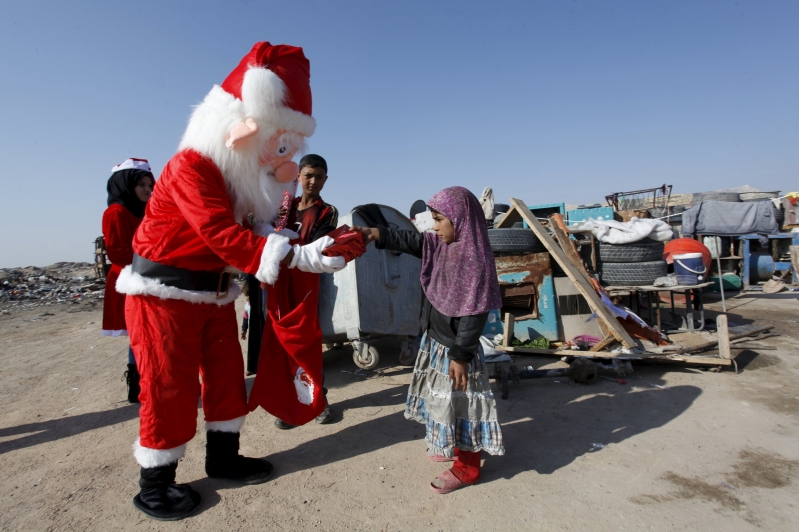
With Christmas falling this year a day after Prophet Mohammad's birthday, the city of Baghdad is holding Christmas celebrations in a sign of brotherhood with Iraq's hard-pressed Christian community.
Fireworks will illuminate the Tigris river every night of the week and a 25-metre (82 feet) Christmas tree has been set up in Zawraa public park. In Zayuna camp, in the east of the city, children listened to Christmas carols on Wednesday and danced with Santa Claus to Iraqi songs.
But, though grateful, many Christians say the gesture comes too late to improve their lot in Iraq, their homeland for nearly 2,000 years, but where Islamic State is making their future increasingly bleak.
"I saw some nice gestures from many people on Facebook and this made me happy, to be honest, that people are celebrating Christmas together with us in defiance of Daesh," said Mariam, a 29-year-old school teacher in Baghdad, referring to Islamic State.
"But is it real? I don't think so," she said.
"Christians who left Iraq don't wish to return and some of them are even nagging us to leave, saying that even if we make it through this , the next one will be the end of it," she added, asking to be identified only by her first name.Islamic State, which swept through a third of Iraq in 2014 in its drive to build a caliphate, has displaced more than 200,000 Christians from the northern region of Nineveh, the cradle of the eastern Assyrian church, according to IraqiChristian MP Imad Yohana.
So uncertain has become the fate of Iraq's Christians that some reminisce about days of Saddam Hussein, the dictator whose rule of a quarter century ended in 2003, when a US-led coalition invaded the country.
"There wasn't any discrimination back in the previous regime, things changed afterwards," said Abu Fadi, a 51-year- old father of three who works in Zayuna camp set up especially for Christian refugees fleeing Islamic State.
A key figure of Saddam's regime, Tariq Aziz, who was his foreign minister, was a Christian. He died in prison in June. Saddam was hanged at the end of 2006.
"The toppling of the regime allowed the previously suppressed extremists to surface, from both sects," added Abu Fadi, referring to Shi'ite Muslims who rose to prominence after Saddam's removal, and Sunni Muslims to whom the dictator belonged and who now feel marginalized.
While the persecution by IS is the worst since the modern Iraqi state was created in the last century, scores of Christians have been kidnapped or killed, or had their churches bombed and been forced to leave their homes since 2004. Iraq's Christian population has dropped from 1.3 million people in the 1997 census to about 650,000 now, said lawmaker Yohana. Their number ought to have been around 2 million by now under normal circumstances, he said.
Western countries make it easier for Christians in the Middle East to obtain visas on human rights grounds, unwittingly contributing to depletion of their numbers, he said.
The Women of Baghdad Association, a multi-religious organization focused on fighting abuse against women, on Wednesday organized a gift distribution in Zayuna camp, where the children listened to a Christmas carol service.
"Christmas is in our hearts religiously, but I am depressed because it is not the same socially," said Said Jalal, 31, a volunteer worker at the camp. '"Most of my family and acquaintances are either displaced or have left."






